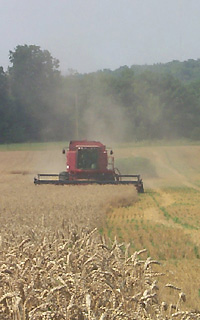Wheat Yielding Better than Expected
Wheat Yielding Better than Expected

Combines are advancing through wheat fields across the state turning out better-than-expected yields.
With the wheat harvest some two-thirds complete, farmers are reporting yields near normal, generally between 50 to 60 bushels per acre, said Lloyd Murdock, a soil scientist and member of the University of Kentucky Wheat Science Group. Some farmers are reporting yields in the 70 to 90 bushel range.
"It's not going to be record-breaking yields, but it's going to be close to normal," he said.
Not only are the yields good, but the grain quality is excellent, said James Herbek, UK Extension grains specialist and another member of the Wheat Science Group. Test weights are among the highest in years, he said.
Farmers in Kentucky are expected to harvest some 340,000 acres of wheat for grain this year, according to the Kentucky Agricultural Statistics Service. The yield is expected to average 56 bushels per acre.
The state's record wheat yield was in 1999 when farmers harvested an average of 60 bushels per acre. Last year's average was 57 bushels, according to the KASS.
This year's wheat crop faced several challenges including downed wheat, lodging, uneven growth and a couple of freezes, Murdock said.
This year's freeze damage occurred because wheat was in a susceptible growth stage in April when temperatures reached 26 to 29 degrees and remained at that level for at least two hours.
Wheat can also sustain serious damage if the weather is excessively wet as it matures, but this year Kentucky had a dry spring. Those dry conditions attributed to minimal disease problems and cool, sunny spring days allowed the grain to mature. Murdock said he had been afraid the spring had been too dry, but it does not appear to have caused a problem.
The high test weights were somewhat a surprise because the state was in a dry period when the grain heads were filling, Herbek said. Probably a lack of disease and pest pressures along with cool nights helped contribute to the grain's quality.